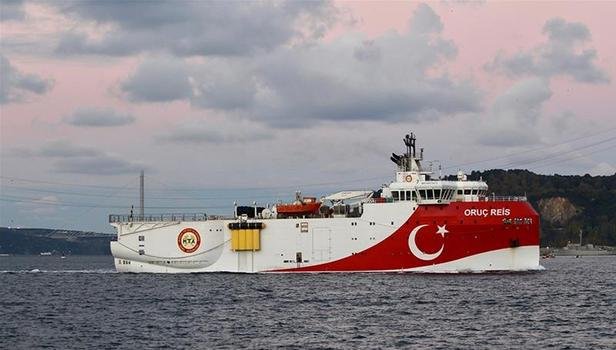Turkey-Greece tension: Turkey will not step back - President Ardoan
25 Aug 2020 ( IBTN News Bureau )
Turkey and Greece have announced that they will hold military exercises in protest against each other near the island of Crete, Greece on Tuesday.
The dispute between the two countries over claims over oil and gas reserves in the eastern Mediterranean has increased.
Turkey issued an official warning that the ships should stay away from the region.
Greece has also announced military exercises after Turkey announced to pursue its investigative mission.
Meanwhile, Germany's Foreign Minister Heiko Maas is arriving in Athens and Ankara on Tuesday, where they will hold talks to reduce tensions.
Heiko Maas will first speak to Greece's Prime Minister Kiryakos Mitsotakis in Athens and then in Turkey with the Turkish Foreign Minister.
Tensions between Greece and Turkey have increased since the discovery of oil and gas reserves in the disputed watershed near Crete and Cyprus.
Greece is also part of the European Union, which has appealed for talks, but France appears to be supportive of Greece. France has also recently conducted military exercises with Greece.
On Monday, Turkey announced that its research ship, Oruk Reis, would continue its work until 27 August 2020. It is believed that Greece is angry with this. Greece is considering Turkey's survey as illegal and is now going to conduct maneuvers against Turkey.
A Greek government spokesman said in a statement, "Greece is responding peacefully and is ready to respond at the diplomatic and military levels." With national confidence, Greece will do everything possible to protect its sovereignty.''
Turkey has also responded in the same language.
Turkish President Ardoआनan has said, "Not a single step will be overtaken by the movements of Turkish Oruk Reis and the warships escorting him."
He said that Greece has put itself in such a trouble that it cannot find a way out.
Greece also adopted an aggressive attitude last month when Turkey issued a naval warning Navtex while sending its ship.
Greece had asked Turkey to withdraw its ship in search of oil in the eastern Mediterranean Sea.
Tensions between Greece and Turkey continue to escalate, but the latest conflict over the gas reserve and water rights issue poses a threat to change.
In July, when Germany announced to send its survey ships to the Greek island of Castellorizo, Germany mediated and averted the crisis. Germany is currently the president of the European Union.
But now these ships and with it five warships of the Turkish Navy are surveying in the waters and the tension has increased again.
There has been a verbal war between NATO member Greece and Turkey.
In the same dispute, Greece has been saying that it will protect its sovereignty and the European Union has said that there should be dialogue between the two countries.
How did the relationship between Turkey and Greece deteriorate?
Turkey and Greece have their own claims regarding the gas reserves and there are huge differences between the two countries over many important areas of the eastern Mediterranean.
Both countries have been asserting their claims on many areas with the argument that they fall under their continental waters.
In July, Turkey issued a naval alert (Navtex) that it was sending its research ship, Oruk Rees, to a survey near the island of Castellorizo, Greece.
The island is located just off the coast of southwest Turkey.
In this survey, Turkey is searching for gas in the areas between Cyprus and Crete.
At that time, the Turkish ship did not raise its anchor from the port of Antalya, but Greece's army was worried about the conflict near the island of Castellorizo.
Turkey and Greece have a cold relationship for the past several months. There is also a dispute between the two countries about migrants entering Greece. And then Turkey rebuilt the Hagia Sophia Museum of Istanbul, a mosque. This building has been an Orthodox Church for many centuries. Greece was also offended by this.
After Germany's intervention, the two countries agreed to negotiate and the matter cooled down for a few days.
But meanwhile, in August, Greece entered into an agreement with Egypt to create a water zone that provoked Turkey.
Negotiations broke out and the Turkish ship Oruk Reis left the port on 10 August. The very next day it reached the waters between Crete and Cyprus.
Why increased stress now?
Turkey and Greece are against each other in the race to develop energy resources in the eastern Mediterranean.
In recent years, large gas deposits have been found in the waters near Cyprus. The governments of Cyprus, Greece, Israel and Egypt have come together to exploit them. Under the agreement, two thousand kilometers of pipeline will be sent gas to Europe.
Last year, Turkey began an oil and gas exploration west of Cyprus. Cyprus is divided since 1974. Only Turkey has recognized Turkey-controlled Northern Cyprus. Turkey has always argued that the island's natural resources are also entitled to it and should be divided.
And then in November 2019, Turkey entered into an agreement with Libya to create a special economic water zone from the southern coast of Turkey to the north east coast of Libya.
Egypt said the agreement was illegal and Greece said it was absurd because it did not refer to the island of Crete, Greece.
Then in May Turkey said it would begin digging in other areas westward in search of oil and gas in the next few months. This led to concerns in Greece and Cyprus, members of the European Union.
Turkey has issued several licenses to Turkish Petroleum to excavate in the eastern Mediterranean. They also have a license to dig around Greece's islands Crete and Rhodes.
In July, Turkish Vice-President Fawat Oktai said, "Everyone should accept that Turkey and the Turkish Republic of North Cyprus cannot be separated from the energy equations of the region."
Then on 6 August 2020, Greece and Egypt responded to Turkey with their agreement. Both created a special economic zone, saying that this would cancel Turkey's agreement with Libya.
Now, apart from sending its survey ship, Turkey has also said that licenses will be issued for exploration of oil and gas in the western region of the continental shelf by the end of this month.
What are legal disputes?
There are many islands of Greece in the Aegean Sea and Eastern Mediterranean that are very close to the Turkish coast. In such a situation, there are complex disputes between the two countries on the water sector and sometimes both countries have come to the mouth of the war.
If Greece extends its waters from six miles to 12 miles under international law, Turkey argues that it could severely affect many of its sea lanes.
Turkish President Rechep Teyep Ardoआनan recently said, "Turkey will not agree to any effort that limits it to its coast".
But the dispute is not only about the water areas but also the special economic zone (EZ) is a big issue. EEZ of Turkey and Libya, EEZ of Egypt and Greece and EEZ of Cyprus and Lebanon, EEZ of Egypt and Israel.
And now this latest dispute also includes continental waters, which can be up to two hundred miles from the coast.
Greece argues that the Turkish survey ship is violating its continental waters. The island of Castellorizo, Greece, is just two kilometers off the coast of Turkey.
While Greece has asked Turkey to leave its continental waters immediately, Turkey says that islands that are far from the mainland and near Turkey cannot have continental waters.
Last month, the Vice President of Turkey said that Turkey is tearing down maps that are designed to limit it to the mainland.
Turkey has also been emphasizing that it is working under the laws of the United Nations on its territories.
What has been the reaction?
Greece's European allies have favored it, although Germany and the European Union are insisting on negotiations.
French President Emanuel Macro has given full support to Greece and Cyprus, saying that Turkey is violating the sovereignty of these countries.
France's relations with Turkey have deteriorated in recent months, particularly with Libya.
Amid escalating tensions, France has said that it is temporarily deploying a freejet and two Rafale aircraft in the region that will also conduct military exercises with Greece.
The US has asked both sides to speak and Neto Secretary General Yance Stoltenberg has said that the situation should be resolved through negotiations, taking care of international laws and NATO brotherhood.
German Chancellor Angela Merkle is making efforts to reduce tensions and has spoken to leaders of both Turkey and Greece.
(Click here for Android APP of IBTN. You can follow us on facebook and Twitter)
Share This News
About sharing
-
 19 Apr 2025
Meme warfare in Trump’s battle with Beijing
19 Apr 2025
Meme warfare in Trump’s battle with Beijing
Meme warfare in Trump’s battle with Beijing
Saturday, Apr ...
-
 11 Apr 2025
Gaza is a post-apocalyptic killing zone: UNRWA chief Philippe Lazzarini
11 Apr 2025
Gaza is a post-apocalyptic killing zone: UNRWA chief Philippe Lazzarini
Gaza is a post-apocalyptic killing zone: UNRWA chief Philippe Lazzarini
-
 11 Apr 2025
Ralph Wilde on the ICJ & why Israeli occupation must end?
11 Apr 2025
Ralph Wilde on the ICJ & why Israeli occupation must end?
Ralph Wilde on the ICJ & why Israeli occupation must end?
Fr...
-
 10 Apr 2025
Can Europeans alone change the course of Russia's war in Ukraine?
10 Apr 2025
Can Europeans alone change the course of Russia's war in Ukraine?
Can Europeans alone change the course of Russia's war in Ukraine?
... -
 10 Apr 2025
What is behind Trump's U-turn on tariffs?
10 Apr 2025
What is behind Trump's U-turn on tariffs?
What is behind Trump's U-turn on tariffs?
Thursday, Apr 10, ...



